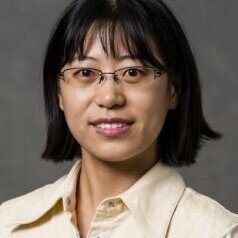CIERP Alumni Perspectives: A Conversation with Fang Zhang
By Alisha Patel
This blog post is part of CIERP and CPL’s AAPI Heritage Month Blog Series, where current Fletcher students interview alums of Asian, Asian American, Pacific Islander heritage about their time at Fletcher and their successful careers in the environment sector.
I assume it is safe to say that we all come to The Fletcher School believing that we have the ability to make a change, and that one day, our work will have an impact on global decisions. Dr. Fang Zhang, who recently became an Assistant Professor in the Department of Global Development and Governance at the School of Public Policy and Management at Tsinghua University in China, is one of the latest examples of this dream being realized. I had the pleasure of speaking with Fang about her journey.
Prior to being an Assistant Professor, Fang was working on a comparative analysis of carbon neutrality trajectories between China and the United States, as a joint post-doctoral fellow between the Harvard Kennedy School and The Fletcher School, under the guidance of Professors John Holdren and Kelly Sims Gallagher. One of the results from this analysis was a joint workshop at the end of April, 2021, between Harvard and Tsinghua on Carbon Neutrality. This workshop, as Fang described, helped climate change experts maintain dialogue between China and the U.S., especially when ties between the two nations became increasingly sour.
When I asked Fang what motivates her, she said the key driver has been her desire to keep learning. She entered her first doctorate program wanting to understand the role of the Chinese government in their great feats in clean energy technology catch-up and innovation that began in the 2000s. After completing her degree, the fire to continue learning was still bright, and Fang wanted to understand how China’s clean energy innovation model differs from that of other countries through a cross-country comparative analysis at our very own Climate Policy Lab at The Fletcher School. Her research focused on China, the U.S., India, and Germany’s energy innovation models.
Fang said this attraction to energy and innovation dates to the early 2000s, when China was rapidly developing renewables, especially in the solar PV sector. In the 2010s, Professor Kelly Sims Gallagher was visiting Tsinghua University as a senior visiting scholar and Fang considers herself lucky to have had the opportunity to be a research assistant for her. They went to do fieldwork together in many cities. Fang said that these trips substantially impressed her and empowered her own interests in energy and innovation.
Here are a few more snippets from our conversation:
Based on your research, what is an innovative energy system reform that stood out to you?
I think renewable energy target setting in India really stood out to me. The Modi government has kept promising ambitious targets in the renewable energy sector, first 175GW by 2020 and now 450GW by 2030. A lot of media criticized these as unfeasible targets which should not be proposed. But when I traveled within India, all the banks and firms I interviewed (as a part of the comparative analysis) refer to these targets and become excited about this long-term vision. It surprised me how ambitious targets in renewables at a national level could leverage public and private investors. It totally changed my mind about the impacts of target setting in energy transition and climate change. Ambitious targets from governments can be very inspiring and impactful.
What are the main policy gaps you see in the global transition to clean energy?
One big gap is the shortage of global RD&D in the clean energy sector. We recently did research to compile a database of global RD&D in this sector. One of the key findings is that global energy RD&D and clean energy RD&D have become stagnant recently. It is far below the level that is required to enable a global clean energy transition.
How has your experience at Fletcher been? Were there any particular moments that left a mark?
It was a terrific journey for me. I think one of the most important lessons that I gained at The Fletcher School is to be ambitious and think big. When I started to design my cross-country comparative analysis, I was not sure whether I could do the interviews by myself in four of the biggest countries, China, the United States, Germany, and India. But my supervisor, Professor Kelly Gallagher, was not concerned at alln about that. She helped me to network and provided selfless connections for me to expand field work in all the countries. In the end, I made it. Specifically, before I went to India, I was so worried that I could probably only do 6-8 interviews, but in the end, I did 25, all of which were very informative.
Do you have any suggestions or advice for students interested in the energy field at Fletcher?
Please be confident about your interest in the field of energy. I used to think that Fletcher focused more on security issues, but this is not the case. Our Dean and Academic Dean are both climate change stars. The CIERP and CPL team is excellent. It is probably the best team, from my view, at The Fletcher School. Especially when you step out of Fletcher, energy and climate change studies provide you with a fantastic platform to work on for all your life.
This issue has been written as a celebration of Asian, Asian American, and Pacific Islander heritage. Would you have any advice for AAPI students at Fletcher?
Do not be shy. Stand up and speak out whenever you want.
Dr. Zhang’s research topics include clean energy innovation, green finance, and technology transfer, and her work can be found here.
This interview has been edited.
Alisha Patel is a dual master’s student at The Fletcher School and Tufts University in the MALD and UEP programs, respectively.

